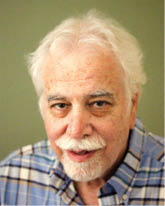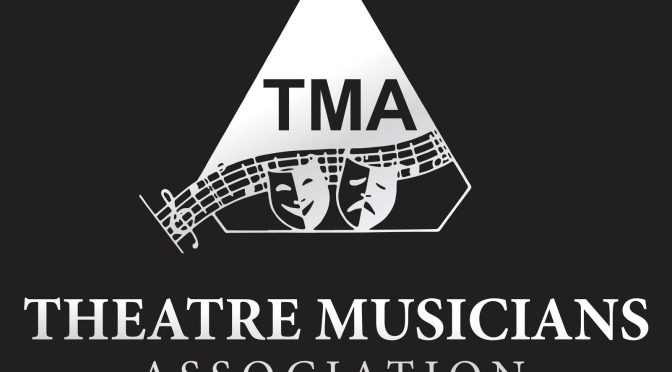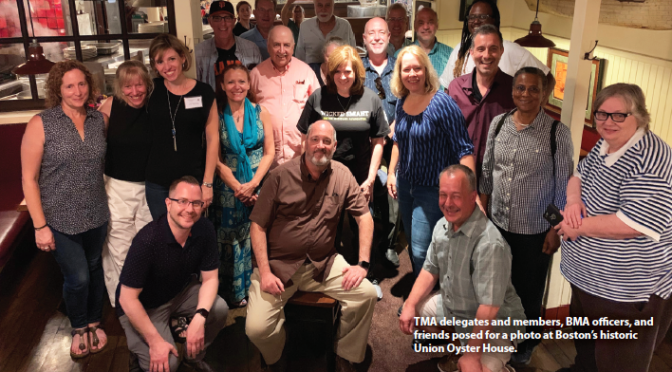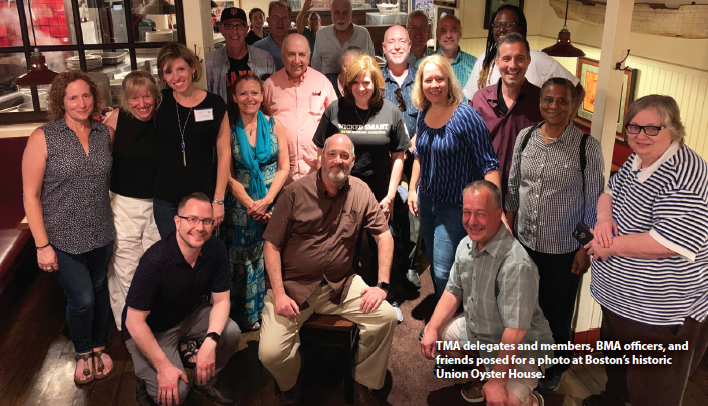by Heather Boehm, Theatre Musicians Association President and Member of Local 10-208 (Chicago, IL)
Greetings from the pit! There is much to report, so let’s get to it. The latest extension of the Pamphlet B/Short Engagement Touring (SET) Agreement expires on August 27. Musicians can expect negotiations for a successor agreement to commence later this summer. Often referred to by the shorthand Pamphlet B, these collective bargaining agreements cover all Federation shows touring under contract and impact hundreds of traveling and local theater players.
In accordance with the current agreement, AFM musicians have followed suit with the per diem raises negotiated by Actors Equity Association earlier this year. This effectively gave musicians touring under the SET Agreement a raise from $131 per day to $170 per day in per diem. It guards against musicians incurring out of pocket expenses when they travel to locations with higher costs of living.
Even with multiple extensions during the pandemic, there is much to accomplish since the last full negotiation in 2016. Amidst seismic events in the theater industry, the work of protecting the jobs of musicians, which are endangered by technical advancements, remains critical. As in the past, the Theatre Musicians Association (TMA) approaches our role on this negotiation team deliberately, collaboratively, and purposefully.
Last April, the TMA Travelers Committee hosted a well-attended FAQ session with AFM Director of Theater, Touring, and Immigration George Fiddler. We look forward to the results of the prenegotiation survey distributed by the AFM. Members of the TMA Executive Board met with local presidents in May to discuss theater issues, increasing awareness of pit musicians, technological trends, and pattern bargaining.
The musicians of the Kennedy Center Opera Orchestra, Local 161-710 (Washington, DC) Board and President Ed Malaga, and the TMA DC/Baltimore Chapter worked tirelessly through the early months of the year to secure additional instrumentation for the summer presentation of The Lion King at the Kennedy Center.
Local 802 (New York City) leadership and players secured 12 musicians (one conductor, one associate conductor, seven side musicians, and three actor-musicians) on an upcoming production of Here Lies Love at the Broadway Theatre. The action network petition garnered over 15,000 signatures, helping to amplify this important issue on social media and protect the 157-year precedent of live musicians on Broadway. (Read more details on page 10.)
It’s a privilege to meet with negotiating committees across the country as part of my work with TMA. I wish solidarity and success to the musicians of Local 677 (Honolulu, HI) and their leadership—President James Moffitt and Secretary-Treasurer Robert Shinoda—on their upcoming negotiations. I hope to be able to report a new TMA chapter in Houston. I am grateful to Local 65-699 (Houston, TX) President Alex Navarro, Secretary-Treasurer Sharon Montgomery, member Lovie Wright-Smith, and the many Houston musicians who joined us in April.
Finally, mark your calendars for August 21-22 and join us in Milwaukee! TMA will be returning to an in-person annual conference for the first time since 2019. Many thanks to the Milwaukee Musicians Association, AFM Local 8, particularly President Robert Levine and Secretary-Treasurer Rich Tremarello for their generous support. Our conference dates fall just prior to the International Conference of Symphony and Opera Musicians (ICSOM) Conference later that week—also at the Hyatt Regency Milwaukee. The TMA Conference Committee (President Emeritus Tony D’Amico, Sue Lerner, and Patrick Plunk) have secured an affordable room rate. Please join us for this important discussion of theater issues with musicians from across the Federation. Visit www.afm-tma.org/ConferenceRegistration.asp to register.
The TMA extends heartfelt thanks to departing AFM President Ray Hair, Secretary-Treasurer Jay Blumenthal, and Vice President Bruce Fife. Hair was president of the TMA’s Dallas-Fort Worth Chapter and he once stated, “Solidarity is the glue that holds the union together. It is both an asset and a liability. It’s a liability because it depends on musicians closing ranks and working together as a whole, which doesn’t always occur, and it rarely happens in a union that pits its members against each other or helps management do it. Or when the members collaborate with management to help the companies get what they want. Organizing solidarity is a daunting task, but when it works, it works well.”












